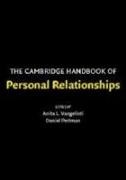Read more
Informationen zum Autor Anita Vangelisti currently teaches courses at the University of Texas at Austin on communication in personal relationships! family communication! communication and emotion! empirical research methods! and interaction analysis. Her work focuses on how communication affects! and is affected by! emotions and interpretive processes such as attribution. She has published articles in journals such as Communication Monographs! Human Communication Research! Journal of Personality and Social Psychology! Personal Relationships! Family Relations! Journal of Adolescent Research! and Journal of Social and Personal Relationships. Daniel Perlman is an academic psychologist with broad! applied interests that cut across social! developmental and clinical psychology as focused on the study of close relationships. He is a Professor of Family Studies in the Department of Psychology at the University of British Columbia. He was President of the International Society for the Study of Personal Relationships and the Canadian Psychological Association. He has authored and edited over 50 articles and 15 books and edited works. Klappentext With the field of personal relationships having grown dramatically in the past quarter century! The Cambridge Handbook of Personal Relationships serves as a benchmark of the current state of scholarship! synthesizing the extant theoretical and empirical literature! tracing its historical roots! and making recommendations for future directions. The authors are international experts from a variety of disciplines including several subfields of psychology! communication! family studies and sociology who have made major contributions to the understanding of relationships. Zusammenfassung With the field of personal relationships having grown dramatically in the past quarter century! The Cambridge Handbook of Personal Relationships serves as a benchmark of the current state of scholarship! synthesizing the extant theoretical and empirical literature! tracing its historical roots! and making recommendations for future directions. Inhaltsverzeichnis Part I: 1. Introduction; Part II. Foundations for Studying Relationships: 2. The Seven Seas of the study of personal relationships: from 'The Thousand Islands' to interconnected waterways; 3. Theoretical perspectives in the study of close relationships; 4. Research methods for the study of personal relationships; 5. Advances in data analytic methods for relationships research: the broad utility of Hierarchical linear modeling; 6. Relationship typologies; Part III. Development of Relationships: 7. From courtship to universal properties: research on dating and mate selection! 1950 to 2003; 8. Marital development; 9. Divorce and post-divorce relationships; Part IV. Relationships across the Lifespan: 10. Relationships in early and middle childhood; 11. Relationships in adolescence and early adulthood; 12. Close relationships in middle and late adulthood; Part V. Individual Differences: 13. Personality and relationships: a temperament perspective; 14. Attachment theory! individual psychodynamics! and relationship functioning; 15. 'His' and 'her' relationships?: a review of the empirical evidence; 16. Intimate same-sex relationships of sexual minorities; 17. Family relationships and depression; Part VI. Basic Processes: 18. Communication: basic properties and their relevance to relationship research; 19. Social cognition in intimate relationships; 20. Emotion in theories of close relationships; 21. I've got you under my skin: physiology and interpersonal relationships; Part VII. Interactive Processes: 22. Self-disclosure in personal relationships; 23. Close relationships and social support: implications for the measurement of social support; 24. Understanding couple conflict; 25. Sexuality in close relationships; Part VIII. Threats to Relationships: 26. Loneliness and social isolati...

